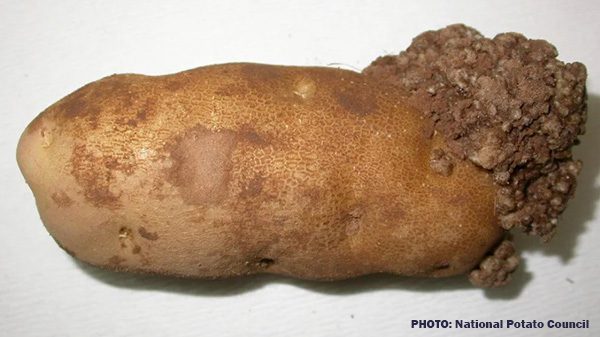How do you destroy a potato?
You put it through a snowblower, which will chop it into lots of tiny pieces.
This is not a joke, and if you are a potato grower on Canada’s Prince Edward Island, it is the diametric opposite of funny. The potatoes must be shredded in frosty conditions to make sure the pathogen is eliminated—the pathogen in this case being the potato wart, which was eradicated in the U.S. in the seventies.
This dreary fate may await much of the PEI potato crop if growers cannot find adequate markets apart from the United States. It is particularly bitter for them inasmuch as this year’s estimated PEI potato crop (as of December 7) was 28,510 cwt, up 35.8 percent from the 2020 crop of 21,000 cwt.
The situation started in October, when potato wart was detected on two PEI farms.
On November 2, the Canadian Food Inspection Agency (CFIA) announced the suspension of the movement of seed potatoes from PEI to the United States. This was followed by a full suspension of all potato exports to the U.S. (and of seed potatoes to other Canadian provinces) on November 22.
The move, welcomed by U.S. agriculture secretary Tom Vilsack, was proactive: the Canadian authorities had every reason to believe that if they did not voluntarily stop potato shipments, USDA would have done so, putting power to rescind the ban in the hands of the U.S. rather than of Canada.
The Prince Edward Island Potato Board, on the other hand, called it “a politically-based trade disruption when potatoes are already in short supply across North America and globally” (a rather odd contention in view of the projected size of the 2021 Canadian potato crop, projected to be 18.2 percent higher than in the previous year).
“Prevention of the spread of potato wart has been done under the auspices of the Long Term Potato Wart Domestic Management Plan, developed by CFIA to prevent spread both within the province and in market destinations for PEI potatoes,” the PEI Potato Board statement continues.
“Since the discovery of potato wart in PEI in 2000, there has not been a single incidence of potato wart in any markets, including the USA and the rest of Canada, attributable to Prince Edward Island potatoes. We have faith in this plan, and so should our government who developed it. The two detections of potato wart in October 2021 were found in fields that were already under regulation as part of this Management Plan. As a result, those potatoes were already ineligible to be shipped to any market outside of Prince Edward Island, including the United States and Canada.”
The PEI growers are particularly chagrined because their request for an exemption for Puerto Rico (which does not grow potatoes and accounts for 25 percent of the PEI potato market) was rejected.
Currently, the industry in both PEI and Puerto Rico are searching ways to keep up supplies to the U.S. island commonwealth.
In early December, PEI growers handed out potatoes in the national capital, Ottawa, to draw attention to their plight. The provincial government has responded with remediation measures.
Nonetheless, the PEI potato industry is casting an uneasy eye back to 2001, when a similar potato wart scare caused it to destroy 300 million pounds of the crop.
“History repeats itself,” wrote Karl Marx: “the first time as tragedy, the second time as farce.”
But PEI potato growers are likely to find a replay of 2001 no more amusing than the original.



